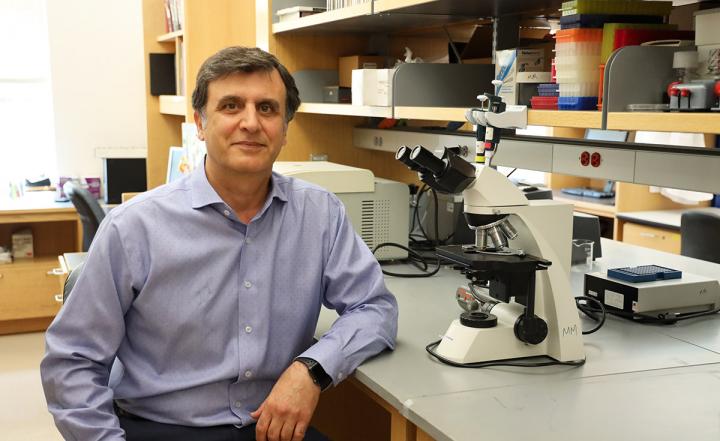
Credit: Blake Belden, VCU Massey Cancer Center
The COVID-19 pandemic has had detrimental effects on global infrastructure sectors, including economic, political, health care, education and research systems, and there is still no definitive treatment strategy for the disease. A team of scientists, including VCU Massey Cancer Center researcher Masoud Manjili, D.V.M., Ph.D., conducted a comprehensive analysis of worldwide COVID-19 data to identify key strategies moving forward to develop effective therapeutics.
In a critical literature review, among the 20 most-read articles published in the Journal of Immunology in May 2020, Manjili suggests that COVID-19 should be treated as an acute inflammatory disease and that severity of infection is associated with the dysregulation of inflammatory immune responses and subsequent inability to develop protective immunity from the virus.
“Drugs that target the virus or suppress inflammatory immune responses have produced inconsistent results and might not be the best treatment for patients with COVID-19,” said Manjili, a member of the Cancer Cell Signaling research program at Massey and a professor in the Department of Microbiology and Immunology at the VCU School of Medicine. “Instead, the use of drugs that modulate inflammation without compromising the adaptive immune response could be the most effective therapeutic strategy.”
The majority of people infected with COVID-19 show flu-like symptoms and survive the disease. However, individuals with susceptibility factors, including age (65 years and above), sex and underlying health complications such as cancer, heart disease, diabetes or asthma, are significantly more vulnerable to infection because their immune response is in disarray. Manjili said that men are more susceptible to infection than women because of an expression of sex-associated genes coded by the X chromosome that play a key role in the immune response.
“Although over 90 percent of infected individuals are asymptomatic or manifest noncritical symptoms and will recover from COVID-19, those individuals presenting with critical symptoms are in urgent need of treatment options,” Manjili said.
Because viral loads are similar in symptomatic and asymptomatic patients with COVID-19, it appears that a dysregulated immune response is the primary cause of death as opposed to viral load, according to Manjili’s review. The most serious consequences of COVID-19 are sepsis-like cytokine storm (a severe overreaction of the immune system), blood clots and respiratory or cardiovascular complications.
In response to injury or infection, the immune system will normally react with an immediate inflammatory response to limit the infection and help to develop a long-lasting, protective immunity against the virus within 7-10 days following infection.
“However, when inflammation is not modulated or resolved after serving its purpose, it turns into hyperinflammation or becomes chronic and results in the inhibition of adaptive immune responses, tissue damage or organ failure, as evidenced in many cases of the novel coronavirus,” Manjili said. “Therefore, understanding and successfully controlling inflammation would be a promising approach for the management of COVID-19.”
Manjili suggests that antiviral therapies such as chloroquine, hydroxychloroquine and remdesevir might be effective as preventive strategies or in very early stages of infection but could prevent patients from gaining protective immunity. Efforts to develop novel treatment options for COVID-19 should be primarily focused on the transference of plasma from immune individuals to those with severe symptoms of the disease as well as a vaccine that prevents infection.
Specifically, Manjili determined that the highly tailored anti-inflammatory drugs, like the blood pressure medication losartan, should be considered as viable options for treating COVID-19.
“The combination of losartan with convalescent plasma in symptomatic patients could be a promising strategy for the prevention or treatment of severe clinical symptoms and will allow patients to develop immunity against the virus,” Manjili said.
###
Manjili collaborated on this paper with Rose Manjili, Pharm. D., of Central Virginia Health Services, Melika Zarei, M.D., of the Virginia Tech Carilion School of Medicine, and Mehran Habibi, M.D., of the Johns Hopkins School of Medicine.
This study was supported by funding from Massey and the Commonwealth Foundation for Cancer Research.
Media Contact
Blake Belden
[email protected]
Related Journal Article
http://dx.




